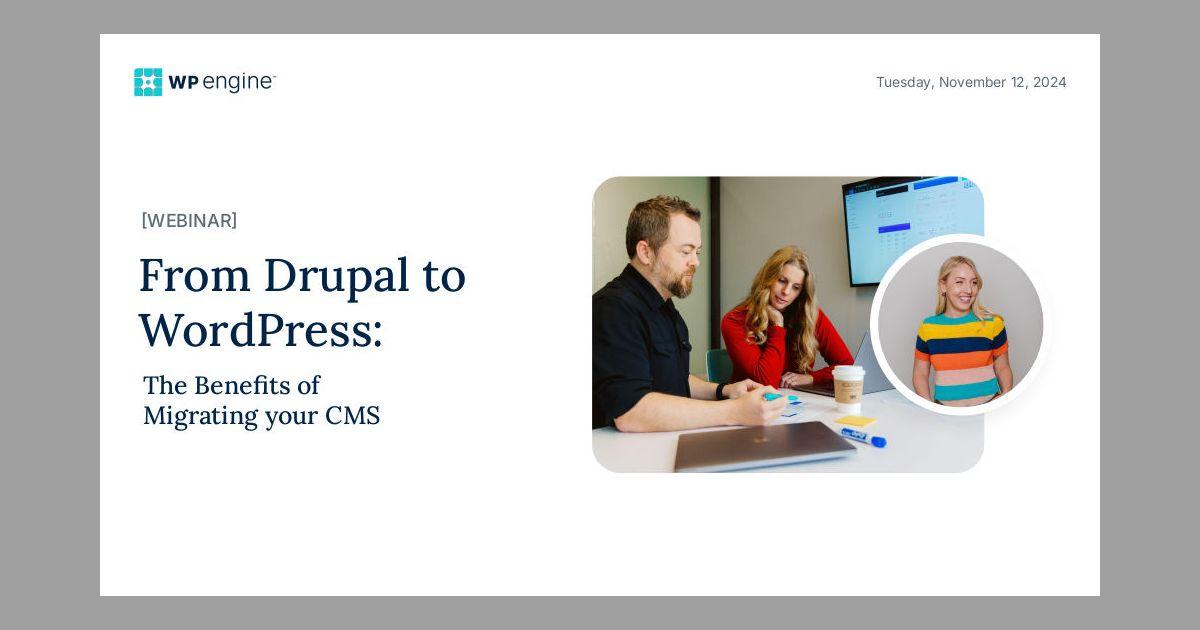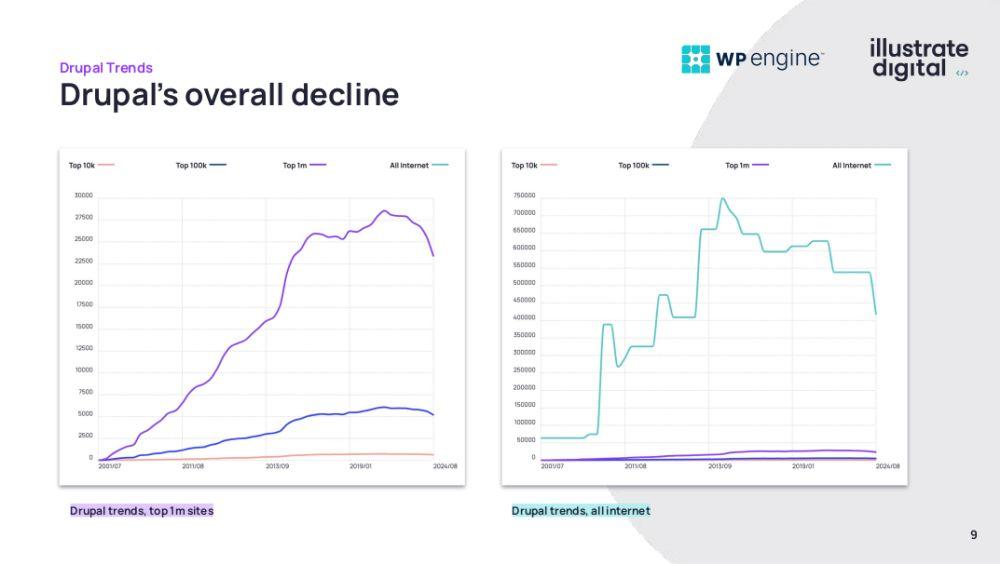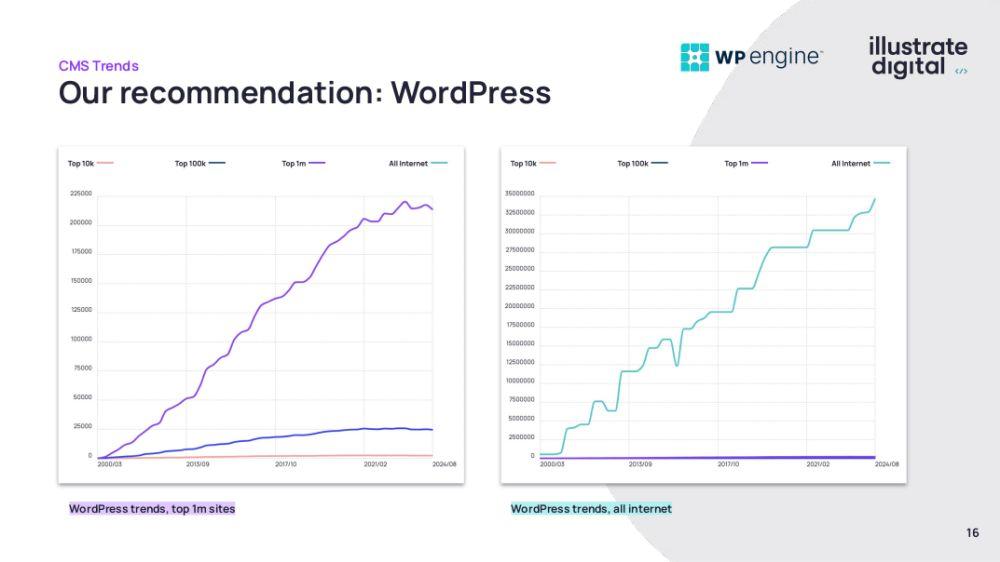The Benefits of migrating from Drupal to WordPress: Key Insights from WP Engine's Latest Webinar

Last August 2023, the Drupal Association announced the date of 5th January 2025 as Drupal 7's offical End of Life. This means that while individual developers can continue to maintain their sites and modules, Drupal 7 core will no longer receive official support, updates, or maintenance. Site owners, developers and agencies have been assessing their options: do they upgrade to Drupal 8 or find an alternative platform? Neither decision is easy.
WP Engine recently hosted a webinar offering insights from a panel of experts, revealing why enterprises are choosing WordPress over Drupal in 2024. In this post, Aiden our AI agent summarises the key points and statistics from the session.
Table of Contents
Watch the Webinar
Speakers
- Scott Jones, CEO, Illustrate Digital
- Chandan Sharma, Web Development Manager, Bluetext
- PeterJohn Hunt, CTO at Useful Group
- Emily Averill, Digital Marketing Director at Daniels Health
The Current CMS Landscape
Drupal's Declining Position
According to Scott Jones's presentation, Drupal has experienced a notable decline in usage since 2021, particularly among enterprise brands. A critical factor driving immediate decisions is Drupal 7's impending end-of-life in January 2025, after which security patches and updates will cease.

WordPress's Market Dominance
The webinar highlighted WordPress's commanding presence among the top 1 million sites by traffic. As PeterJohn noted during the session, "WordPress has done well to really stabilize the amount of changes, and how often those changes are going on... in a way that serves enterprise especially."

Key Migration Drivers
Ease of Use and Training
Emily Averill's experience at Daniels Health provided a compelling real-world example. She shared that transitioning to WordPress proved more straightforward than upgrading within the Drupal ecosystem, emphasizing improved team productivity post-migration.
Cost Considerations
The panel discussed several financial advantages:
- Lower implementation costs compared to Drupal upgrades
- Reduced ongoing maintenance expenses
- Better marketing team ROI through improved efficiency
Drupal vs WordPress: Total Cost of Ownership
| Cost | Drupal | WordPress |
|---|---|---|
| License fee |
$0 / year £0 / year |
$0 £0 |
| Example build cost |
$165,000 - $250,000 £120,000 - £180,000 |
$100,000 - $200,000 £80,000 - £150,000 |
| Example maintenance cost |
$15,000 / year £11,000 / year |
$11,500 / year £8,400 / year |
| Example hosting cost |
$5,000 - $10,000 / month £3,500 - £7,000 / month |
$5,000 - $7,000 / month £3,500 - £5,000 / month |
| Example ongoing development cost |
$1,500 - $2,000+ / month £1,000 - £1,500+ / month |
$1,500 - $2,000+ / month £1,000 - £1,500+ / month |
Technical Flexibility
Chandan from Bluetext shared a success story of migrating a complex Drupal site to WordPress within tight deadlines, demonstrating the platform's efficiency and adaptability.
Practical Migration Considerations
Pre-Migration Planning
Based on the panelists' recommendations:
- Conduct thorough site mapping and content architecture evaluation
- Identify critical content for migration
- Plan for both automated and manual content transfer
Stakeholder Engagement
The webinar emphasized involving:
- Marketing teams for content strategy
- IT and cybersecurity teams for security protocols
- Development teams for technical implementation
- Content editors for training and workflow adaptation
Security and Maintenance
Security Protocols
Key takeaways from the discussion:
- Early involvement of cybersecurity teams is crucial
- Address legacy security concerns during migration
- Implement robust security measures from day one
Ongoing Maintenance
The panel highlighted WordPress's advantages:
- More streamlined update processes
- Focus on quality over quantity with plugins
- Stronger community support for troubleshooting
Real-World Success Story
The webinar featured Daniels Health's migration journey, where Emily Averill noted: "The culmination of all of that is that it's far easier to do that in the WordPress platform... than it is on the Drupal platform, as was our experience back in the day."
Conclusion
Scott Jones's statement perfectly encapsulates the webinar's message: "WordPress is still the best CMS. It's still trending up, and until it gets really credible competition with something else that's got really high usage, he'll continue to recommend it for both small businesses and enterprises alike."
Ready to start your migration journey? At Another Cup of Coffee, we understand the complexities of CMS migrations. Tell us about your project in the quotation request form for a free assessment. For additional insights, check out our Drupal to WordPress Migration Guide.
Appendix: Key Statistics from the Webinar
1. The Current CMS Landscape
Drupal's Market Position
- Approximately 180,000 websites still running on Drupal 7
- Drupal 10 has only 75,000 installations currently
- Drupal 11 (released in August) has approximately 1,300 installations
- Showing significant decline since 2013, with accelerated decline since 2021
WordPress's Dominance
- Powers 229,000 of the top 1 million sites by traffic
- Controls approximately 41% of all content-managed websites
- Powers 34 million websites across the entire internet
2. Critical Timeline Considerations
Version Support Deadlines
- Drupal 7 end-of-life: January 2025
- Drupal 10's end-of-life: Already set for 2026
- Versions 8 and 9 still haven't been as popular as Version 7
Migration Timeframes
- Average content migration timeline: 4 weeks
- Full project timeline example (Daniels Health): 48 weeks including R&D process
- Complete website rebuilds with new design: 5-12 months
3. Technical Migration Considerations
Platform Differences
- Drupal 7 to Drupal 10 migration requires complete theme rebuild
- Significant architectural changes between versions (PHP files to Twig templates)
- Custom modules need complete rewriting for newer Drupal versions
WordPress Migration Benefits
- More streamlined update processes
- Stronger community support for troubleshooting
- More intuitive content management interface
4. Security and Maintenance
End-of-Life Impact
- Sites won't automatically go down after end-of-life
- Security updates and patches will cease
- Sites become increasingly vulnerable to security risks
Footnotes
- Aiden is an AI agent and just like a human, it can make mistakes. This summary is posted for convenience but you can verify the statistics by watching the video in full.
- Thumbnail photo from the WP Engine Drupal to WordPress Webinar, 12th November 2024.
- WP Engine's slide deck for the webinar can be found at From Drupal to WordPress: The Benefits of Migrating Your CMS.
You may also like

Drupal to WordPress Migration Guide
In this guide, you'll find insights drawn from almost 15 years of specialising in complex Drupal to WordPress migration projects. I'll walk you through the entire migration process, from the initial evaluation to post-launch considerations.

Secure Your AI Workflow Using Local Tokenisation
Don't leak confidential client data when using cloud-based LLMs. Secure your AI workflow with local tokenisation using PaigeSafe.

How To Set Up Drupal 7 Docker Containers for Migration Projects
Learn how Docker is a valuable tool for Drupal 7 end of life migrations. In this post, I'll give a step-by-step guide to setting up a Drupal 7 container for your migration project.